Politics
About Andrew Cusack
 Writer, web designer, etc.; born in New York; educated in Argentina, Scotland, and South Africa; now based in London.
Writer, web designer, etc.; born in New York; educated in Argentina, Scotland, and South Africa; now based in London. read more
News
Blogs
Reviews & Periodicals
Arts & Design
World
France
Mitteleuropa
Knickerbockers
Argentina
The Levant
Africa
Cape of Good Hope
Netherlands
Scandinavia
Québec
India
Muscovy
Germany
Academica
Nick and Miriam
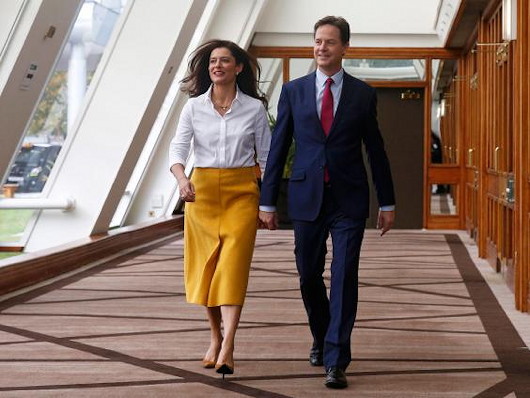
The Lib Dems are justifiably an unpopular lot, but their obvious defects aside one can find time to love a bare few of their number.
Sir Ming — sorry, Lord Campbell of Pittenweem now — will always be my favourite Liberal leader: captain of the Scotland team at the 1966 British Empire & Commonwealth Games, Chancellor of the University of St Andrews, as well as my MP when I lived in the Kingdom of Fife.
The prize for favourite unsuccessful Liberal candidate goes to my former tutor, the arch-monarchist Rt Rev Dr Ian C Bradley, who contested Sevenoaks for the Liberals at the February 1974 general elections. (Incidentally, the seat was later contested by Tim Stanley for the Labourites in 2005.)
But I also have to confess I’ve always rather liked Nick Clegg. While the overwhelming majority of politicians are mediocre, he enjoys the élan of a continental mediocrity rather than a more English strain. In fact, Nick Clegg’s incredibly boring and voter-friendly English name disguises a polychromatic background. On his father’s side he is descended from the Engelhardts (a Russian noble family of Baltic-German ancestry) and is indeed a distant cousin of Count Michael Ignatieff, leader 2009-2011 of Canada’s Liberal Party, while his mother is a Hollander of the Dutch East Indies. No surprise then that Clegg claims fluency in French, Dutch, German, and Spanish. What a waste he was as DPM: he would’ve made a decent Foreign Secretary.
I suppose as an inveterate cosmopolitan myself I must subconsciously find some strange affinity with this ex-leader of the Lib Dems. But chatting with my friend Roland the other day we decided that really the best thing about Clegg is not the man himself but his spectacular wife.
Being stylish, beautiful, Spanish, and Catholic, Miriam González Durántez manages to combine many wonderful and desirable qualities. She is also very obviously in charge. “Oh, Nicky darling, you are agnostic? How cute. The children are being raised Catholic.” And she looks great in Liberal yellow — not a colour every woman can pull off.
If the Lib Dems are looking to increase their vote-share and return to former prominence they could do worse than making Miriam leader. But then — with the exception of Leeds North West with its Chestertonian pro-life real-ale-and-trams-obsessed Lib Dem MP — this is a party unlikely to ever capture the Cusackian vote.
The End of Liberalism
Viktor Orban on the end of the liberal age and the threat to Europe
In a speech to supporters at the Fidesz party’s fourteenth annual Kötcse picnic, the Hungarian prime minister Viktor Orbán has claimed that the refugee crisis is a portent of the end of “the era of liberal babble”. The current “identity crisis” of liberalism, Orbán argued, presented both “huge risk” and “a new opportunity” to return to Christian and communal identities.
Mr Orbán said that the dominant liberal ideology had weakened Europe while preserving its wealth. “The most dangerous combination known in history is to be both rich and weak,” he argued. “It is only a matter of time before someone comes along, notices your weakness, and takes what you have.”
“The liberal philosophy is a result of a Europe which is weak and which also wants to protect its wealth; but if Europe is weak, it cannot protect this wealth.”
Mr Orbán also attacked the liberal imperialism of military intervention, asserting it has been based on fundamental hypocrisy and simplistic Manichean thinking: (more…)
Putin: ‘I’d really like to see Europe show some real independence and sovereignty’
‘Europe is facing a specific problem: an influx of immigrants’ the Russian president asserts in an interview for Swiss television
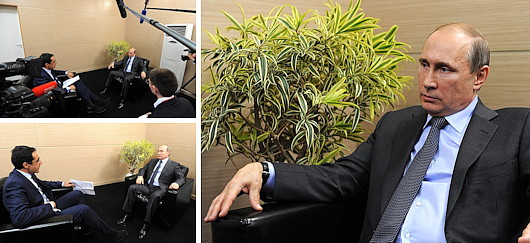
Here are a few excerpts from the interview, dealing with (among other issues) the balance of power, independence and sovereignty in Europe, and relations with the United States.
Vladimir Putin: Bonsoir.
Vladimir Putin: This is done by dishonest and inattentive people. The process of starting a new arms race began from the moment of the United States’ unilateral withdrawal from the ballistic missile defence treaty. Because this agreement was a cornerstone for the entire international security system. And when the United States withdrew from it and began to create a missile defence system as part of its global strategic weapons system, we immediately said: we will be obliged to take reciprocal steps to maintain a strategic balance of power.
I want to say something very important: we are doing this for ourselves, to ensure the security of the Russian Federation, but we are also doing it for the rest of the world, because this strategic stability ensures the balance of power.
Vladimir Putin: My mother and father. My brother, whom I never met, died here during the seige.
Vladimir Putin: I hope not. But I would really like to see Europe demonstrate some real independence and sovereignty and be capable of defending its national interests, the interests of its people and its nations. […]
Vladimir Putin: […] Participation in any military and political organisation or bloc is associated with the voluntary renunciation of a certain share of one’s sovereignty.
I think that at the time, France withdrew from NATO to preserve its sovereignty more than it is possible within the framework of a military bloc. It is not our business to analyse European nations’ foreign policy. But I think you’ll agree that if we need to discuss intra-European affairs with European partners in Washington, it is not very interesting.
Vladimir Putin: I think that this is not so much support for me as the realisation of national interests as the political parties see them.
There are certain tectonic changes underway throughout the world and in Europe within the public consciousness, which are aimed at defending national interests. You must understand that right now, Europe is facing a specific problem, an influx of immigrants. And did Europe make the decision that ultimately led to this situation? We need to be sincere and honest: these decisions were made across the ocean, but Europe must deal with the problem.
Vladimir Putin: Of course. This is just one example, but there are many. But this does not mean – and I already said this – that we should somehow demonise US policy; that is not my goal. They are conducting their policy as they see necessary in their interests.
We must strive to find a balance of interests; we need to invigorate our work, give new momentum to the work by the UN Security Council. The US is certainly a great power and the American people created this nation over several centuries, it is simply an amazing result. But that does not mean that today’s US authorities have the right to travel throughout the world and grab anyone to drag back to their prison or act from a position of “anyone who is not with us is against us.”
We need to be patient and work with our American colleagues to find solutions, the way we have in some areas of our cooperation, such as with the Iranian nuclear issue.
[…]
Vladimir Putin: After our interview, do you think I am mad?
Vladimir Putin: This is part of political struggle; it has been part of my life for quite a number of years. I try not to pay too much attention to it. I simply do what I think is necessary in the interests of my country and my people.
It is not in Russia’s interests to be in confrontation with other countries, but sometimes we are forced to protect our interests, and we will undoubtedly continue to do so. However, we will seek solution not in confrontation, particularly military confrontation, but in finding compromise and mutually acceptable solutions.
With your help I would like to address not those who criticise me, but those who support me. I would like to thank them for their support and tell them that we will continue moving ahead together. Above all, I am referring not to those who portray me [as Stalin], but to those who sympathise with what we are doing and agree with it deep inside.
Merci beaucoup.
Evolution of a Napoleonic Parliament
The Salle des états in the Palais du Louvre
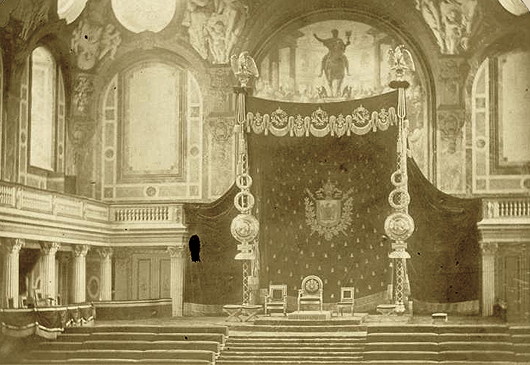
Among the numerous rituals of the ordinary visitor’s pilgrimage to Paris — trip up the Eiffel Tower, lunch at a tourist-trap café — braving the teeming hordes in the Louvre to view da Vinci’s ‘Mona Lisa’ ranks near the top. What very few of the camera-toting hordes realise is that they are shuffling through the room that once housed France’s parliament. The history of the Palais du Louvre is long, exceptional, and varied.
Originally built as a stern castle in the 1190s, the Louvre’s secure reputation led Louis IX to house the royal treasury there from the mid-thirteenth century. Charles V enlarged it in the fifteenth century to become a royal residence, while François Ier brought the grandeur of the Renaissance to the Louvre — as well as acquiring ‘La Gioconda’. In 1793, amidst the revolutionary tumult, part of the palace was opened to the public as the Musée du Louvre, but the Louvre has always housed a variety of institutions — the Ministry of Finance didn’t move out until 1983.
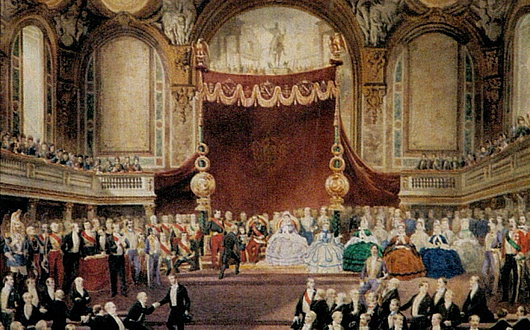
Napoleon III took as his official residence the Tuileries Palace which the Louvre was slowly enlarged towards over the centuries to incorporate. The Emperor needed a parliament chamber close at hand so he could easily address joint sittings of the Senate and the Corps législatif (as the lower house was called during the Second Empire) which opened the parliamentary year. By doing so at his residence, the Bonaparte emperor was following the example left by his kingly Bourbon predecessor Louis XVIII. (more…)
The Swiss model
Harold James advocates scaling up small country democracy, if the members of the European Union are ever to succeed in settling upon a working model of democracy. He explains why the Swiss model of “Konkordanzdemokratie” has much to offer.
From Schweizer Monat via Eurozine.
SWISS PEOPLE TEND to regard their political, social and economic order as something quite unique, that cannot be replicated elsewhere. That is a pity. Switzerland would not only do other countries a terrific favour by exporting its political and social order; it would also help make its own existence more viable, in the midst of an environment that has become quite threatening. Exporting Swissness would be an act of self-interest and not just altruism.
The members of the European Union are in desperate need of a working model of federalism and of democracy. Are there any useful or instructive foreign models for modern Europe in its hour of need? The history of the United States has some appeal. Many Europeans now regularly cite Alexander Hamilton’s famous negotiation in 1790 of the assumption of state debts by the federal government as a model for how a United States of Europe might be created. But the actual turn of events is less than appealing. The individual states embarked on a borrowing binge in the late 1830s, that was then followed by widespread default in the early 1840s. The revenue stream that was used to service the federal debt – the external tariff – represented a necessary part of the Hamilton scheme that was also inherently and intensely conflictual, and proved to be a cause of increased tension between the American North and the South.
Situated in the heart of Europe, the Swiss experience might offer a superior example for modern Europeans. (more…)
A Bill Committee in the Commons
A Bill Committee meeting in one of the richly decorated committee rooms of the Palace of Westminster. The Minister is standing, rattling on in an explanatory defence of his government’s bill. Ostensibly these committees exist so that MPs can examine legislation in line-by-line detail and raise questions about whatever points or aspects they believe might cause problems if enacted.
“The question is that Clause 15 stands as part of the Bill.”
The Chairman, an MP of considerable experience, presides, assisted by a retinue of civil servants. He chews a pen and stokes his brow, frustrated by the boredom of the subject at hand. He is perhaps thinking of the weekend and the extreme unlikeliness that he will get down to the coast, and his sailboat, given the inclement weather.
A Scottish Member rises on a Point and the Minister yields the floor. Concerns are expressed about the precise meaning of Subclause 36 Paragraph C and insinuations made about potential costs. The Minister rises and suggests the Member’s criticism is excessively harsh. He then concedes he may have been imprecise in his explanation of the process involved in Subclause 36 Paragraph C.
The Doorkeeper, absurdly and arcanely attired in white tie, tails, and with the royal arms hanging from a gold chain round his neck, wears thick-rimmed glasses and leans back on a desk in a carefree fashion, blissfully paying little attention to the point the Hon. Gentleman has made in response to the proposed amendment.
“Just for the sake of clarity, we are not now talking about Amendment 13?”
“I have no intention of moving Amendment 13.”
“On a Point of Order then, Mr Chair, is it proper that the Member discuss Amendments 21 and 26 when he is not moving Amendment 13, which is the first Amendment to be considered?”
The Chairman corrects that it is perfectly alright for the Member to discuss whichever amendment he would like.
There are at least eleven civil servants in the room. One on the side hands a paper to another. He reads it and nods approvingly before passing it on to the civil servant next to the Chair. Another Member rises to discuss Amendment 54 Clause C.
“There’s an important role for an independent body to exercise scrutiny over this area and it would be wise for it to have a statutory basis.”
The entire proceedings are overshadowed by the continual sound of shuffling papers. One Member doodles on the day’s order-paper. A journalist leaves. The Member stops doodling and consults his iPhone. Then the Minister is grateful for that point. He is surprised but aware, since he was given this junior ministerial role, by the frequency with which this matter has arisen and has spoken before the relevant Select Committee.
Another Member’s face is illuminated by the glow of the iPad he is leaning over.
“Now before I become too Churchillian,” the Minister continues, “I think we’d better turn to the matter of the Amendments. Now the Honourable Member has, perhaps understandably, raised the point…”
A female Member smiles and shares a jest with one of her party colleagues. The Doorkeeper’s shift ends and he is replaced by one of his bearded confrères. The civil servant beside the Chairman folds a paper and stares unthinkingly into the distance.
“In respect for the Hon. Gentleman’s desire for continuing debate and discussion with the relevant authorities…”
“He hasn’t addressed my point about Subsection 2!”
The portly Doorkeeper moves with surprising adroitness in delivering a note from a Member to a civil servant across the room. The Minister’s PPS hands him a relevant paper. The Chairman smiles in response to one of the Minister’s light-hearted remarks.
“I’m sure the Minister will agree that this is not the beginning of the end but merely the end of the beginning.”
“If only!” a Member interjects.
It is 3:32pm. The MPs will be here for hours yet.
France Marches for Marriage
Led by a provocative comedian, a gay atheist, and a socialist teacher, protest against same-sex marriage draws one million
As many as a million protesters descended upon Paris from every corner of France today to demonstrate their opposition to the Socialist government’s plans to introduce same-sex civil marriage. The Prefecture of Police estimates at least 380,000 participated in the three marches from different starting points that converged at the Champs de Mars in front of the Eiffel Tower. Organisers, however, set up counting stations and claim that, by 7:30pm tonight, over one million protestors had joined the march.
Volunteers charted more than eight hundred vehicles to bring protestors to Paris, while six TGV high-speed trains were reserved for demonstrators. “Had the conditions for chartering trains not been as stringent,” an organiser told Le Figaro “the number could easily have been double.”
“In the freezing cold,” Le Figaro reports, “young, old, and families with children were trying to keep warm waving thousands of pink flags to the jerky rhythm of techno music.”
The entire workforce of the Directorate of Public Order & Traffic was called out to handle the massive demonstration, which forced a Paris Saint-Germain football match to be brought forward. Police believed it would be impossible to secure the area around the Parc des Princes stadium when hundreds of thousands of protesters were expected in the centre of the French capital.
The protest today was organised by the eccentric comedian Frigide Barjot, founder of the Collectif pour l’humanité durable, joined by gay atheist Xavier Bongibault of the association Plus gay sans mariage (“More Gay Without Marriage”), and Laurence Tcheng of La gauche pour le mariage républicaine (“The Left for Republican Marriage”).
The unlike troika claim to have launched “a guerrilla war” against the current Socialist Party government’s proposed same-sex civil marriage legislation. Avoiding the mainstream media, ‘Team Barjot’ went direct to supporters through social media such as Facebook and Twitter, and, countering the government’s branding of same-sex civil marriage as “Mariage pour tous”, named their protest “Le Manif Pour Tous” (‘The Protest for All’), asserting that all children have a right to a mother and father.
If opinion polls are to be believed, the campaign against the proposed law seems to be changing perceptions. From 2000 to 2011, polls showed a steady rise in support for same-sex marriage. In 2012, this percentage began to decline; support for allowing same-sex couples to adopt also fell. Meanwhile, polls claim that 69% prefer same-sex marriage be put to a referendum. (more…)
The Iconography of Party
Taking into account the important aesthetical nature of politics, it might be worthwhile taking a sweep round the political parties to see what their emblems, logos, and symbols look like. (more…)
In Defence of Orbánisation
The silent majority of Hungarians have at last found a voice in the Fidesz party – and the European Commission don’t like what they are hearing.
by ALEXANDER SHAW in Brussels
In under two years, Viktor Orbán’s regime has reduced the Hungarian budget deficit, reduced personal income taxes, returned the GDP to growth and proclaimed sovereign primacy over supranational diktats. Adopted at the beginning of this year, Fidesz’s new national constitution finally overthrows the Communist era law of 1949. Hungary is the last former East Bloc nation to have achieved this. It is hardly surprising, therefore, that 300,000 Hungarians marched to support their government when the reforms came under fire from the EU in January. It was the biggest demonstration in Hungary since the regime change. The message was clear: Fidesz’s democratic mandate is as mighty as ever and Hungarians want sovereignty. (more…)
‘Called Before the Tribunal of Reason’
Some Essays of Pierre Manent in English
I’VE BEEN ON a Pierre Manent kick recently, whom a friend in Paris describes as “a giant, grossly under-rated in the Anglophone world and treated with considerable disdain even in France on account of not being a prisoner of ephemeral conventional wisdom. ”
Given the current penitential season, it might be worth reading Manent’s “Reason and Faith: A Lenten Reflection”. This paragraph was one among the many that struck me with its accuracy:
Christian faith, for its part, accepts being called to appear before the tribunal of reason. It is distinctive of the Christian God to leave man to his own counsel, and to put the fulfilment of the plan of salvation as it were at the mercy of human freedom. This is why Christianity is not a law, but a faith. This is why the Bible is not a teaching dictated by heaven like the Koran. It is a chronicle, full of detours, of an often-broken and ever-renewed covenant between divine goodness and human freedom.
Much of Manent’s pondering is on the realm of political philosophy. His 1999 essay “The Return of Political Philosophy” explores the death of political philosophy over the course of the twentieth century, while his lecture “Current Problems of European Democracy” examines the depoliticisation of European societies. “The Greatness and Misery of Liberalism” is also worth a read.
Hungary Reasserts Sovereignty
Deputy PM Navracsics asserts to shocked Commissioner that Council of Europe “cannot impose anything which runs counter to our constitution”
Hungary yesterday declared its sovereign primacy over the EU. In a heated dialogue between Tibor Navracsics and Commissioner Neelie Kroes, the Hungarian deputy PM staidly remarked that his country would not impose legislation which was contrary to its new constitution. The packed committee room gasped in horrified awe. Kroes was visibly furious as she stormed out, expressing her usual ‘grave concerns’ about Hungary.
Kroes had obviously been banking on Navracsics’s compliance with the Council of Europe’s recommendations, EU member states being bound to comply with the Council of Europe’s Fundamental Charter of Human Rights under the Treaty of Lisbon. The Hungarian government is under scrutiny from the EU for the possible breach of various articles of the Charter. When asked directly where his priorities lay in implementing recommendations, however, the founding member of the ruling Fidesz party stated “I’m a Hungarian member of parliament and I have sworn allegiance to the constitution of Hungary.” (more…)
Adding to Ulster’s Party Panoply
Tim Montgomerie’s ConservativeHome website reports that the Conservative & Unionist Party is setting up its own party in Northern Ireland, following the failure of its collaboration with the Ulster Unionist Party. At the last election, the Tories ran a joint ticket with the UUP under the name ‘Ulster Conservatives and Unionists – New Force’ which fell rather flat.
In the years before the party system was as solidly formalised as it now is, Unionist MPs took the Conservative whip at Westminster but today the SDLP is the only Northern Irish party which takes the whip of a British party (in its case, Labour). Gradually official Unionists found themselves increasingly challenged by upstarts, which evolved into the formal division between the Ulster Unionist Party (moderate liberal-conservative unionists) and Paisley’s Democratic Unionist Party (hardcore conservative unionists).
The decision to start a separate Conservative & Unionist party for Ulster is a curious one, as it can only further split the Unionist vote, already divided between the dominant DUP and the fading UUP. This is at least simpler than in the 1990s and 2000s, when the vote split between these two and smaller Unionist groupings like the UK Unionists, the Progressive Unionist Party, the Ulster Democratic Party, and the Northern Ireland Unionist Party.
My favourite Unionist Party, however, was that which dominated the political scene in the Punjab from the First World War until Partition. It was primarily the instrument of the Muslim, Hindu, and Sikh gentry of the province, and counted three holders of knighthoods — Sardar Sir Sikander Hayat Khan, Sir Fazli Husain, and Rao Bahadur Sir Chhotu Ram — among its founders. Alas, with the increasing enmity between the Hindu and Muslim populations of India, its existence became unsustainable, and even the Punjab Province itself was split between Pakistan and India at independence. Sic transit gloria mundi!
Opening Parliament Down Under
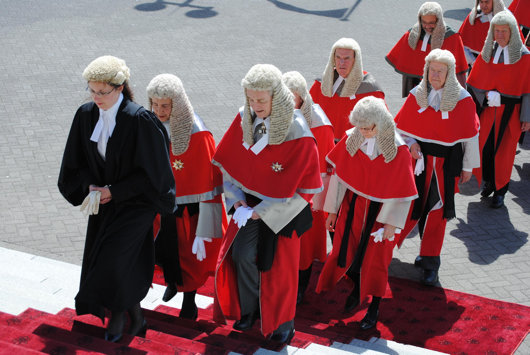
I’m a fan of state openings of parliament, so it might be a surprise that I’ve never been to one. I did see some of the practice run-through for the State Opening in Cape Town (which involves a delightful parade of the Cape Town Highlanders and other units from the Castle to Parliament) but unfortunately a social occasion kept me from the actual opening itself. As my luck would have it, I managed to return to live in Blighty again the one year the blasted Government decided not to have a State Opening. Roll on, 2012! Anyhow, down in the Antipodes, the New Zealanders have just had their State Opening of Parliament in the realm’s capital city of Wellington. (more…)
Burn Baby Burn!
A Burning-in-Effigy at Exposes the Cowardices of Tomorrow’s Politicians
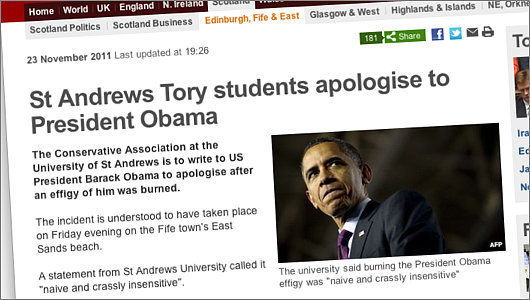
I cannot condemn this in more stringent terms. The Tories at the University of St Andrews have apparently burnt Barack Obama in effigy and then backtracked with all manner of pussyfooting around and the standard issue of apologies. Burning in effigy is a perfectly legitimate form of political expression and has been verified by centuries of tradition.
What’s more, I suspect there’s a bit of the old racism behind the apologies: would anyone have bat an eyelid if Mr Obama’s predecessor had been burnt in effigy by students? I, for one, would have happily joined in both effigy-burnings. The more effigies burnt the merrier. Chesterton remarked “It is terrible to contemplate how few politicians are hanged”, and I would suggest effigy-burning is a potentially more wholesome if less efficacious alternative.
If you’re going to burn an effigy, burn an effigy and then stick with it. But the weak-kneed, shilly-shally Tories always want to engage in a bit of old-school fun before hoisting up the white flag and issue an “unreserved public apology”. Rank hypocrisy of the highest order! Ye cannae have yer cake an’ eat it, too!
California Floreat
As Alex Massie writes over on his Spectator blog, Governor Jerry Brown of California “has taken to slapping down the kind of mollycoddling absurdities much favoured by that state’s woeful legislature”. “Governor Moonbeam”, as he is nicknamed, recently vetoed a bill proposing to criminalise skiing or snowboarding by children without a helmet.
“While I appreciate the value of wearing a ski helmet, I am concerned about the continuing and seemingly inexorable transfer of authority from parents to the state.” As His Excellency points out, “Not every human problem deserves a law.”
When I was a child, skiing with a helmet was unheard of; but then we were taught to ski without even poles.
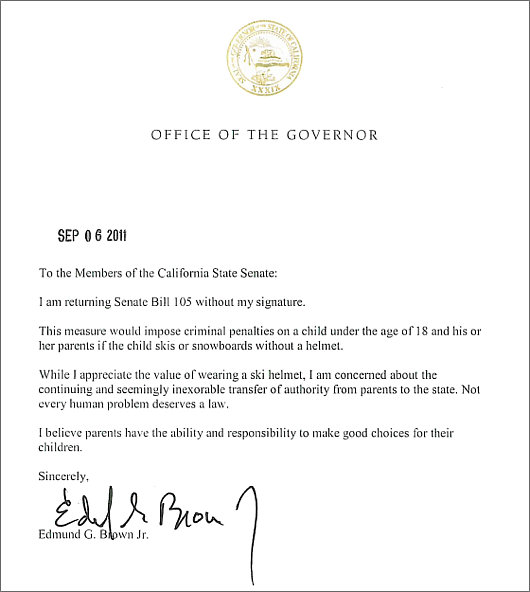
Too moderate to defend the defenseless
Betty Ford was ‘a strong female voice for moderate Republicanism’
Over at Telegraph Blogs, Tim Stanley posts the following about Betty Ford, the First Lady of the United States who died recently:
Betty was a strong female voice for moderate Republicanism. It was the Republicanism of New England suburbs, Wall Street brokerage firms, golf clubs, yacht houses, East Coast fraternities, drunken bridge games and James Stewart. It was wrong on so many things, but it was gentle and sophisticated and meant well.
The suburbs, the Wall Street firms, the golf clubs, yes, but also the abortion clinics. Mrs. Ford was an ardent supporter of a woman’s right to kill her child. So many evils are easily excused because they were gentle, sophisticated, and meant well.
Senator Eugene McCarthy: A Kirkian Anecdote
Russell Kirk, the great St Andrean and American man of letters, relates this anecdote in his article “Will American Caesars Arise?” (Modern Age, Summer 1989):
The most interestingly complex of all recent aspirants to the presidency, [Senator Eugene] McCarthy obdurately called himself a liberal during years when that appellation was sinking swiftly in popular favour – although he abjured all forms of liberalism earlier than Franklin Roosevelt’s. (During the past few years, as he now remarks, he has employed the word ‘‘liberal’’ as an adjective merely.) In his political theories, actually, McCarthy has been a conservative: He declared long ago that Edmund Burke was his political mentor, and no one has more warmly praised Tocqueville. He has read seriously and written intelligently. In the White House – per impossibile – he might have turned the most imaginatively conservative of Presidents.
Or perhaps not. Once upon a time I had an assistant who was a graphoanalyst, an expert on handwriting. Having examined a specimen of Senator McCarthy’s handwriting, my assistant pronounced him rebellious, a hard master, and desirous of power. A touch of Caesar even in Caesar’s adversary? However that may be, McCarthy’s only considerable assertion of power was his unseating of President Johnson by running a good second in the New Hampshire primary of 1968.
A congenital no-sayer, Eugene McCarthy never ran with the hounds. He was candid and witty always. He and I first met as debaters before a large audience, in Boston. After this exchange, sponsored by the Paulist Fathers, a reception was held for us. Up to Senator McCarthy came a zealous young Paulist, inquiring, “Senator McCarthy, don’t you think that Jack Kennedy is the finest president this nation ever has had?” (This occurred during the first year of the Kennedy administration.)
“No,” said McCarthy, unsmiling.
Although taken aback, the Paulist returned to the charge: “But surely you agree, Senator, that President Kennedy has given this nation a new hope, a new vigor, a sense of moving forward toward great things?”
“No,” said Eugene McCarthy.
The Paulist persisted: “But of course you’ll agree with me when I say, Senator, that the Kennedy family have brought to our life a culture, a refinement, a meaningfulness, that we have not known before.”
“No,” said Eugene McCarthy.
“But – but Senator McCarthy, surely Jack Kennedy is a very nice man personally?”
Eugene McCarthy turned his back upon the Paulist and slowly walked away. He knew how to say no, he was not ensnared by cliché and slogan, and he had a poet’s attachment to truth.
Les fondements de notre civilisation occidentale
« Les fondements de notre civilisation occidentale sont chrétiens ; le respect du christianisme est une condition sine qua non d’une droite qui veut conserver non seulement la prospérité économique, mais ce qui est au fondement de toute prospérité durable : le souci du bien commun, le respect de la loi naturelle, le sens de la justice. »
The latest issue of Égards, the premier journal of traditional conservatism in Quebec, contains an interesting analysis of the current situation faced by the various streams of the centre-droit spectrum in the province. I am, however, very much against the perpetual organisation-founding that goes on in political circles. There seems to be a belief that, when in doubt, start a new organisation, but this is precisely what the author, M. Décarie, proposes.
Solution «N» for Flanders?
Matthias Storme’s thoughts on keeping Flanders in the E.U.
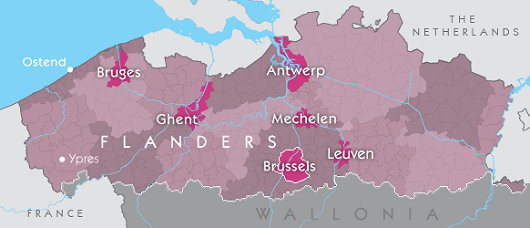
PURSUANT TO OUR previous discussion of the dissolution of the confederal Hollandic archipelago in the Caribbean, the ever-interesting Flemish philosopher & university professor Matthias Storme suggests an interesting solution to the Belgian question. Opponents of Flemish secessionism frequently argue that should Flanders gain independence from Belgium, it would not automatically continue its membership in the European Union and would be forced to seek re-admission on its own. Professor Storme posits what he calls Solution «N», which has its basis in the Charter for the Kingdom of the Netherlands and Article 355, Paragraph 3 of the Treaty on the Functioning of the European Union. (more…)
A Pro-Life Politico in Argentina
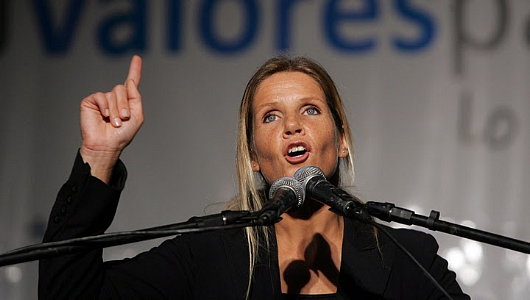
In the Sunday after-church tea-drinking circles of Manhattan, much thought and disputation was provoked by Damian Thompson’s recent revelation that the senator-elect from Florida, Mr. Marco Rubio, is in fact an evangelical Protestant despite his office claiming he is a Catholic. Word comes from Argentina about a member of parliament named Cynthia Hotton, a brazen defender of the right to life and solidarity with the unborn. (more…)
Search
Instagram: @andcusack
Click here for my Instagram photos.Most Recent Posts
- In the Courts of the Lord February 13, 2025
- American Exuberant February 10, 2025
- Crux Alba Journal Launch February 10, 2025
- The Year in Film: 2024 February 10, 2025
- Articles of Note: 27 January 2025 January 27, 2025
Most Recent Comments
- on When an American aristocrat meets a European Grand Duke
- on The Year in Film: 2024
- on Jesuit Gothic
- on The Borough Synagogue
- on No. 82, Eaton Square
- on Christ Church
- on The Last Will and Testament of Louis XVI
- on Amsterdam
- on Season’s Greetings from the Seventh
- on Season’s Greetings from the Seventh
Book Wishlist
Monthly Archives
Categories


